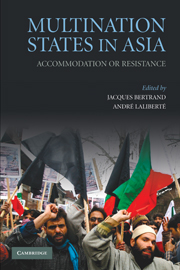Book contents
- Frontmatter
- Contents
- List of Tables and Figures
- List of Maps
- List of Contributors
- Acknowledgments
- Maps
- 1 Introduction
- 2 Revolutionary State Formation and the Unitary Republic of Indonesia
- 3 The Crisis of Border States in India
- 4 Pakistan: Neither State Nor Nation
- 5 Constitutional Politics and Crisis in Sri Lanka
- 6 The Dilemmas of Burma's Multinational Society
- 7 The Double-Edged Sword of Autonomy in Indonesia and the Philippines
- 8 China and the Virtual Taiwan Nation
- 9 The Failure of Ideologies in China's Relations with Tibetans
- 10 Leninism's Long Shadow in Central Asia
- 11 Conclusion
- References
- Index
5 - Constitutional Politics and Crisis in Sri Lanka
Published online by Cambridge University Press: 05 June 2012
- Frontmatter
- Contents
- List of Tables and Figures
- List of Maps
- List of Contributors
- Acknowledgments
- Maps
- 1 Introduction
- 2 Revolutionary State Formation and the Unitary Republic of Indonesia
- 3 The Crisis of Border States in India
- 4 Pakistan: Neither State Nor Nation
- 5 Constitutional Politics and Crisis in Sri Lanka
- 6 The Dilemmas of Burma's Multinational Society
- 7 The Double-Edged Sword of Autonomy in Indonesia and the Philippines
- 8 China and the Virtual Taiwan Nation
- 9 The Failure of Ideologies in China's Relations with Tibetans
- 10 Leninism's Long Shadow in Central Asia
- 11 Conclusion
- References
- Index
Summary
In Multicultural Odysseys, Will Kymlicka observes sharp differences in the way North America and western Europe, on the one hand, and eastern and central Europe and Africa and Asia, on the other, have responded to the claims of minority nations (Kymlicka 2007). Some multinational polities such as Canada, Belgium, the United Kingdom, and Spain have come to see themselves not as nation-states, but as multination states and have, accordingly, given symbolic recognition to minority nations and reconfigured themselves constitutionally to reflect their multinational character. Other states have rejected and even suppressed – often violently – the political claims of minority nations. This appears to be particularly true in Asia. Kymlicka suggests that, with the notable exception of India, Asian states have been extremely resistant to the claims of minority nations, for a variety of reasons – the legacy of colonial divide-and-rule strategies which empowered minority ethnic groups, concerns over geopolitical security, fear of petty tyrannies, and the belief that ethnic mobilization would disappear as a result of modernization and development.
Sri Lanka is one of the many examples Kymlicka cites. It is not hard to understand why. Demographically, Sri Lanka fits his model of a multinational polity. It contains a large, Sinhala-speaking majority (74 percent of the population), as well as a large, Tamil-speaking minority (13 percent) who traditionally hail from the northeast of the island, where they constitute a majority. Both the Sinhalese majority and the Tamil minority are engaged in competing projects of nation-building.
- Type
- Chapter
- Information
- Multination States in AsiaAccommodation or Resistance, pp. 103 - 135Publisher: Cambridge University PressPrint publication year: 2010
- 2
- Cited by

